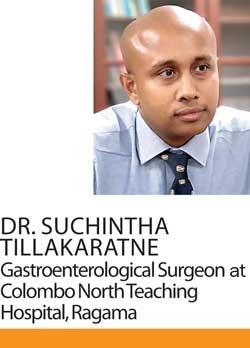07 Aug 2020 - {{hitsCtrl.values.hits}}

Doctors performing the first ever child liver transplant in Sri Lanka
 A team of doctors at the Colombo North Teaching Hospital was able to carry out the first successful paediatric liver transplant last week. However, according to Gastroenterological Surgeon Dr. Suchintha Tillakaratne from Colombo North Teaching Hospital, Ragama Liver Transplant surgery is a very complex surgery. It’s chosen as a possible treatment only if the risk of living without transplantation outweighs the risk of complications of surgery and long-term effects of immunosuppression. Understanding this, it is important for the patient as well as the caregivers to be cautious and attentive to ensure a full recovery without complications.
A team of doctors at the Colombo North Teaching Hospital was able to carry out the first successful paediatric liver transplant last week. However, according to Gastroenterological Surgeon Dr. Suchintha Tillakaratne from Colombo North Teaching Hospital, Ragama Liver Transplant surgery is a very complex surgery. It’s chosen as a possible treatment only if the risk of living without transplantation outweighs the risk of complications of surgery and long-term effects of immunosuppression. Understanding this, it is important for the patient as well as the caregivers to be cautious and attentive to ensure a full recovery without complications.

Liver rejection
Your immune system has the job of keeping viruses, harmful bacteria and other organisms out of your body. Without medicines, the immune system can see your new liver as a foreign invader. This is called ‘rejection’. Some level of immune response is quite common and occurs in more than half of liver transplants, usually within five to ten days but possibly at any time.
Warning signs of rejection
If a patient experience any of these signs, the physician should be contacted immediately. To prevent rejection of the new liver, medication will be given to make the immune system less aggressive called immunosuppressants. These medications should be taken as recommended by the physician the rest of your life. Patients are advised to, always take the medications at the time ordered and the exact dose prescribed and keep the medications in their original bottles or packaging in a dry place, out of sunlight and out of children’s reach.
Moreover the long-term surveillance of the liver is done to prevent complications of liver rejection. Early identification is beneficial as treatment is available for liver rejection.
“When patients are on long-term immunosuppression medication, they can develop certain medical conditions such as kidney damage, hypertension, hyperlipidemia, diabetes, osteoporosis, etc.,” Dr. Tillakaratne commented. Therefore patients are being closely monitored with periodic testing for blood sugar levels, lipid levels, blood pressure, bone health and renal functioning.
The patients have a slightly increased risk of malignancies due to long-term immunosuppression.The most common malignancies are Lymphoproliferative disease, skin cancers, cervical cancers, colorectal carcinoma, Oropharyngeal carcinoma and Hepatocellular carcinoma (HCC).
In addition, Dr. Tillakaratne claimed that due to long-term use of immunosuppressants, transplant patients were more prone to infections.
Signs of Infection
these include;
To determine the nature of the infection doctors may take blood, urine and mucus samples, as well as samples from areas outside of the body such as the surgical wound and drainage site.
In order to prevent infection,
Diet and exercise
Dr. Tillakaratne emphasised that particularly during the first three months after your transplant, it is important that you avoid eating foods that may contain bacteria such as listeria, salmonella or E.coli. Patients might be more vulnerable to food poisoning and this can be a problem whilst you are on high doses of anti-rejection drugs. Therefore you must avoid unpasturised milk, unpasturised cheese and soft cheese, live yoghurt, food that contains raw egg, soft serve ice creams, refrigerated smoked seafood and fish, shellfish, unwashed salads and Deli meats.
Some medication may result in weight gain. To stay at a healthy weight, it is sensible to reduce your consumption of simple carbohydrates and increase intake of complex carbohydrates. It is also helpful to restrict how much fat you eat, not just to limit weight gain but also to help control your cholesterol. It is also important to eat sufficient protein to enable your wounds to heal and to build muscle.
Taking up a healthy lifestyle with exercise built-in is an important part of your recovery from a transplant. You should avoid strenuous exercise for the first couple of months and check with the physician that this will not cause problems. It is important not to lift heavy items until your wound has healed and for at least the first two months after transplant.
21 Dec 2024 9 minute ago
21 Dec 2024 6 hours ago
21 Dec 2024 8 hours ago
21 Dec 2024 21 Dec 2024
21 Dec 2024 21 Dec 2024